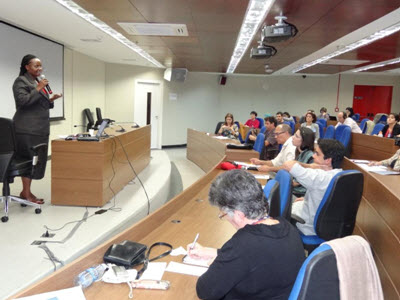
EMBRAPA Enhances Biosafety Communication Capacity of Journalists
November 18, 2011| |
Scanty knowledge on modern biotechnology and inadequate flow of information from experts to journalists has hindered understanding and hence effective reporting on agricultural biotechnology in Brazil. This was the verdict of more than 40 journalists from EMBRAPA - Brazilian Agricultural Research Corporation, who attended a biosafety and risk communication training course in Brasilia, Brazil on 8-9 November 2011.
The training was organized by the Latin America – LAC Biosafety (www.lacbiosafety.org) project and provided a unique opportunity for journalists from EMBRAPA, who serve as liaison between the institution and the various stakeholders served. It aimed at enhancing risk communication capacities on research and commercialization of biotech crops in the country.
The journalists called on EMBRAPA scientists and researchers to be more open and share research findings on both benefits and risks associated with the technology throughout the project phases. Sandra Zambudio, one of the journalists said, "We do not want to do public relations on the technology but to communicate objectively about its products, we however do not get all the information from experts." The journalists recommended the need for training on basics of biotechnology to enable them put into context stories about the various projects in the country. They also proposed that EMBRAPA scientists should reach out to the journalists and familiarize themselves on how media operates, for mutual benefit in communicating effectively about modern biotechnology.
Dr. Margaret Karembu of ISAAA Africenter served as the resource person for the biosafety communication session and was complemented by Drs. Olivia Nagy Arantes and Deise Maria Fontana Capalbo of EMBRAPA, LAC-Biosafety, Brazil.
In September 2011, the National Technical Commission on Biosafety (CTNBio) approved a genetically modified (GM) bean resistant to the golden mosaic virus, the first transgenic plant that is entirely produced by public research institutions.

For more on the training and other news on biosafety in Brazil email Deise M. F. Capalbo, LAC Biosafety Project Coordinator for Brazil at deise@cnpma.embrapa.br.
| |
Biotech Updates is a weekly newsletter of ISAAA, a not-for-profit organization. It is distributed for free to over 22,000 subscribers worldwide to inform them about the key developments in biosciences, especially in biotechnology. Your support will help us in our mission to feed the world with knowledge. You can help by donating as little as $10.
-
See more articles:
-
News from Around the World
- Global Commission on Sustainable Agriculture Forwards Recommendations
- Scientists Sequence Genome of Medicago
- FAO: Traditional Crops Need Protection from Climate Change
- New Global Research Collaborations Announced at the ICG-6
- BASF and Cargill Partner on GM Plant Omega-3 Project
- Argentina: 67th Signatory of the Nagoya Protocol
- Cassava Virus Spreading in East Africa
- Research Brief on Use of Radio in Biotech Communication
- APHIS to Improve GE Petition and Risk Assessment Processes
- EMBRAPA Enhances Biosafety Communication Capacity of Journalists
- Domestication of Soybean Started Earlier than Thought
- Corn and Wheat Prices Up
- USEPA Approves Genuity® VT Double PRO® RIB Complete™
- Biotech Communication Challenges in Australia, China, and India
- Vitamin A Maize for Southern China
- A Rapid PCR-Based Detection Method of Black Leaf Streak Disease in Indonesian Banana Crops
- Scientists Develop New Product to Boost Kiwifruit Vine Disease Immunity
- Position Paper on Food Security and Safety
- Agrifood Clusters Form the European Food Alliance
- EU Court of Justice Directive on Honey Containing Pollen Derived from GMO
-
Research Highlights
- Scientists Study Tritrophic Interactions Among Bt Maize
- Transformation of Cabbage Using Bt cry1Ba3
- Coloring GM Soybean Grains By Suppression of ANR1 and ANR2
-
Beyond Crop Biotech
- Purdue Scientists to Improve Biosensors Using Carbon Nanotubes
- Stop Signal Discovered for Skin Cancer
-
Announcements
- 7th International Congress on Nitrogen Fixation
- Biotech Risk Assessment Research Grants Program
-
Read the latest: - Biotech Updates (January 28, 2026)
- Gene Editing Supplement (January 28, 2026)
- Gene Drive Supplement (February 22, 2023)
-
Subscribe to BU: - Share
- Tweet
